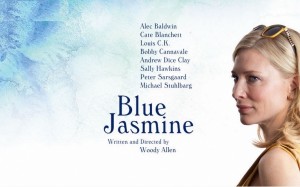Blue Jasmine
Posted on August 1, 2013 at 6:00 pm
Two sisters. One imagines herself living a life of ease, comfort, graciousness, and elegance that does not really exist. The other is more accepting of her lower middle class life, her carnality, her limited expectations. The first sister loses everything and comes to live with the second. Woody Allen may have been inspired by Tennessee Williams’ “Streetcar Named Desire” in this modern San Francisco story of two sisters, one desperately trying to hold herself together for one more shot at a wealthy husband and the other more realistic but still holding on to some notion of romance. 
Cate Blanchett plays the self-named Jasmine, who lived in blissful — if willful — ignorance as a one-percenter, married to Hal, a wealthy businessman (Alec Baldwin). She floated from Pilates to shopping to gala to spa as he shifted funds from one shady offshore corporation to another. She would shake her impeccably coiffed head and murmur that she had no head for business and he would chuckle indulgently and pull another diamond bracelet out of his pocket. She and her sister Ginger (Sally Hawkins) were both adopted and were never close. But family is family, and when Hal goes to jail for Bernie Madoff-style fraud, Jasmine has no money and nowhere else to go. We first see her on the plane from New York to San Francisco, telling the woman sitting next to her what is clearly a story she has told many times before, about her first meeting with Hal, when “Blue Moon” was playing, and about their fairy tale ending of luxury and parties. She ignores the ugly “ever after” the way she glosses over the evident boredom of her listener, turning from annoyance to pity and then discomfort.
Blanchett, who has played Williams’ fragile Blanche on stage, is magnificent as Jasmine, a narcissistic woman who has been coddled and in denial for so long that she does not have the strength of mind or spirit to engage in an honest appraisal of her situation. Ginger is only slightly better. She can ask Jasmine how (and, by implication, why) someone without any money would travel first class and seems to have few illusions about the economic or emotional prospects with her rough-hewn fiancé, Chili (Bobby Cannavale). She does not hold a grudge over the money she lost by investing with Hal or the destructive impact it had on her first marriage to Augie (Andrew Dice Clay in a nicely textured performance). But she, too, has some illusions, and is easily taken in when she meets Al (Louis C.K.) a man who seems to have the stability and finesse that Chili does not.
Longtime Allen collaborator Santo Loquasto evokes the contrasting worlds of the two sisters with impeccably evocative production design and Sonia Grandes costumes are quite literally right on the money, with Jasmine’s gorgeous Chanels and Hermes and Ginger’s shapeless, cheap glamor. Even the expensive bag she selects as a gift from Jasmine is superficially glittery. The cinematography by Javier Aguirresarobe is so gorgeous it might even make Alvy Singer leave his heart in San Francisco.
But this movie is easier to admire than to like. It has some points to make about superficiality and corruption, but there is no one to root for or care about. The last act twist is telegraphed a third of the way in and the issues it raises are quickly abandoned. Allen as a director is still getting better, but as a screenwriter he needs to do a few more drafts.
Parents should know that this film includes sexual references and non-explicit situations, adultery, fraud, drinking, drug use, smoking, and strong language.
Family discussion: Why is it important that the sisters were adopted? Which one made poorer choices about men? What will happen to them next?
If you like this, try: “Crimes and Misdemeanors,” another Woody Allen film about contrasting siblings confronting life choices
